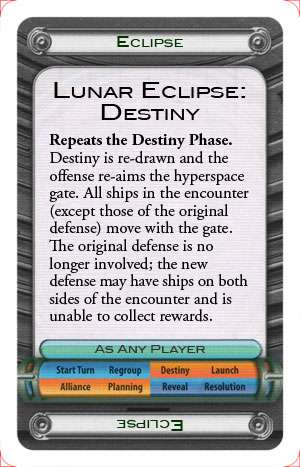Solar Eclipses have always acted as a distraction, causing temporary chaos. When played, they cause a phase to be skipped. They are played in the phase preceding the skipped one; for example a Solar Eclipse that skips Destiny is played at the end of the Regroup phase.Here's a mockup of a card, created by Bill Martinson:
Lunar Eclipses usually cause weird stuff to happen. When played, they cause a phase to be repeated, after which the game resumes where it left off. They are played at the end of the phase to be repeated or any time after that; for example a Lunar Eclipse that repeats Launch can be played at the end of Launch or during Alliance, Planning, Reveal, or Resolution.
 The cards would allow a player to affect a certain phase of the encounter in some way that hopefully gives him or her an advantage. There are a lot of interesting possibilities, and it's a good fit for the Reward deck.
The cards would allow a player to affect a certain phase of the encounter in some way that hopefully gives him or her an advantage. There are a lot of interesting possibilities, and it's a good fit for the Reward deck.Below are some examples of the cards:
Solar Eclipse (Regroup): Skips the Regroup Phase. The offense does not retrieve a ship from the warp. This effect may not be played if the offense has no available ships.
Solar Eclipse (Destiny): Skips the Destiny Phase. The hyperspace gate remains in the previously-attacked system; the defense is the same player as the previous encounter. This effect may not be played if the offense was defending in the previous encounter or there has been no previous encounter.
Solar Eclipse (Launch): Skips the Launch Phase. The defense points the hyperspace cone. The offense launches a single ship.
Lunar Eclipse (Launch): Repeats the Launch Phase. The offense may re-aim the hyperspace gate and launch an additional 1-4 ships.
Lunar Eclipse (Alliance): Repeats the Alliance Phase. All allied ships are returned to colonies before allies are re-invited.
Lunar Eclipse (Planning/Reveal): Repeats the Planning and Reveal Phases. Encounter cards are selected in addition to the ones already played; a new encounter card only interact with the opponent's new encounter card and vice versa. A negotiate card is ignored if a player's other encounter card is an attack.
